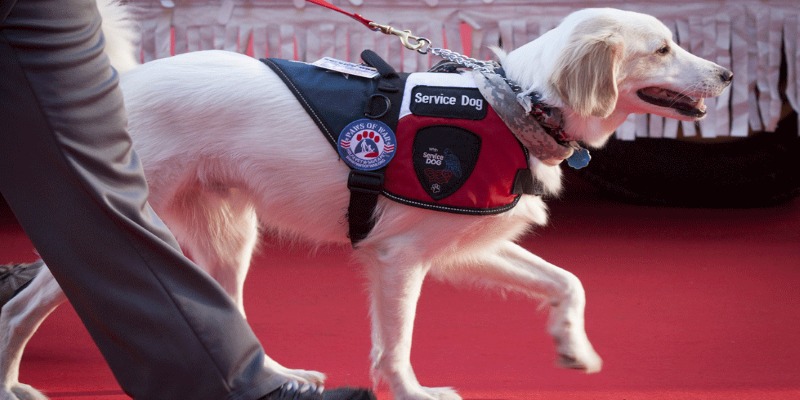Service Dogs and Insurance Policies: A Comprehensive Guide
May 04, 2024 By Triston Martin
If you own a service dog or are thinking about getting one, you might wonder if insurance will help pay for the expenses linked to these important helpers. Service dogs play a crucial role in the lives of many individuals with disabilities, offering assistance and support in various tasks. In this article, we'll delve into the topic to clarify whether insurance typically covers service dogs and what factors may influence coverage.
What is a Service Dog?
Before we delve into insurance coverage, let's first understand what service dogs are. Service dogs are specially trained to assist individuals with disabilities, including visual or hearing impairments, mobility limitations, epilepsy, diabetes, and psychiatric disorders such as PTSD. These highly trained dogs perform specific tasks to help their handlers navigate daily life and overcome challenges.
Types of Service Dogs
Service dogs are highly trained animals that assist individuals with various disabilities, providing valuable support and enhancing their quality of life. These dogs undergo rigorous training to perform specific tasks tailored to the needs of their handlers. Here's a detailed explanation of the common types of service dogs:
Guide Dogs
Also known as seeing-eye dogs, guide dogs assist individuals with visual impairments by navigating obstacles and guiding them safely through their environment. These dogs are trained to stop at curbs, avoid obstacles such as low-hanging branches or uneven terrain, and navigate busy streets and intersections.
Hearing Dogs

Hearing dogs are trained to assist individuals with hearing impairments by alerting them to important sounds in their environment. These sounds may include doorbells, alarms, phone calls, or approaching vehicles. Hearing dogs use their acute sense of hearing to alert their handlers through physical cues such as nudging or pawing, allowing them to respond to auditory stimuli effectively.
Mobility Assistance Dogs
Mobility assistance dogs support individuals with mobility limitations by performing tasks that enhance their independence and mobility. These tasks may include retrieving dropped items, opening doors, turning on lights, and providing stability while walking or climbing stairs. Mobility assistance dogs are trained to assist individuals with physical disabilities, including those using wheelchairs or mobility aids.
Medical Alert Dogs
Medical alert dogs are trained to detect changes in their handler's health condition and alert them to potential medical emergencies. These dogs are often trained to recognize specific scent changes associated with conditions such as seizures, diabetes, or allergies.
Psychiatric Service Dogs
Psychiatric service dogs provide support to individuals with psychiatric disabilities, including PTSD, anxiety disorders, depression, and other mental health conditions. These dogs offer emotional support, calming techniques, and assistance with coping mechanisms to help their handlers manage symptoms and navigate daily life.
Does Insurance Cover Service Dogs?
The coverage for service dogs under insurance policies can vary depending on several factors, including the type of insurance, the purpose of the service dog, and the individual's specific circumstances. Here's a breakdown of the typical insurance coverage for service dogs:
Health Insurance: In most cases, health insurance policies do not cover the cost of obtaining or maintaining a service dog. However, some policies may cover certain medical expenses related to the service dog's care, such as veterinary bills or prescription medications.
Insurance for Homeowners or Renters: Certain insurance policies for homeowners or renters might cover liability associated with owning a service dog. This coverage may protect against claims for property damage or bodily injury caused by the service dog.
Pet Insurance: While traditional pet insurance policies generally do not cover service dogs, there are specialized insurance plans available specifically for service animals. These plans may cover expenses such as veterinary care, emergency medical treatment, and liability protection.

Travel Insurance: When it comes to traveling with your service dog, some travel insurance policies may offer coverage for expenses related to your service dog's travel, such as transportation fees or emergency veterinary care while away from home.
Disability Insurance: Certain disability insurance policies may provide coverage for service dogs as part of their benefits package. These policies may offer financial assistance to help cover the costs of obtaining, training, and maintaining a service dog for individuals with disabilities.
Factors Influencing Insurance Coverage
Several factors can influence whether insurance will cover service dogs and to what extent:
Type of Disability: Insurance companies may consider the type and severity of the handler's disability when determining coverage for a service dog. Disabilities that significantly impair the individual's ability to perform daily tasks or maintain independence may be more likely to receive coverage.
Training and Certification: Some insurance policies may require service dogs to be trained by a certified organization or trainer to be eligible for coverage. Proof of training and certification may be necessary to qualify for certain benefits.
Medical Necessity: Insurance coverage for service dogs may be more likely if the dog's assistance is deemed medically necessary by a healthcare provider. Documentation from a healthcare professional detailing the necessity of the service dog's assistance may support claims for coverage.
Policy Exclusions: It's essential to review the terms and exclusions of your insurance policy carefully to understand what is covered and what is not. Some policies may have specific exclusions related to service animals or may require additional endorsements for coverage.
Cost of Maintenance: Insurance coverage for service dogs may also be influenced by the ongoing costs associated with maintaining the dog, such as veterinary care, grooming, and specialized equipment. Some insurance policies may provide coverage for these expenses, while others may require the handler to bear the cost independently.
Conclusion
While insurance coverage for service dogs may not be widespread, there are options available to help mitigate the costs associated with these invaluable companions. Whether through specialized insurance plans, homeowner's or renter's insurance, or other forms of assistance, individuals with disabilities can often find support to ensure their service dogs receive the care they need. Learning about what affects insurance coverage and supporting the rights of service dog owners can make it easier for people with disabilities to get the services they need.

Jan 22, 2024 Triston Martin

Sep 08, 2024 Sid Leonard

Mar 23, 2024 Susan Kelly

Dec 12, 2023 Triston Martin

Feb 07, 2024 Susan Kelly

Dec 18, 2023 Triston Martin